All hail Asif!
We all know what a beautiful place Abbottabad is. But, we at Us desk, admire Abbottabad for one more reason - one of our most prolific writers it has produced. Yes, folks, we are talking about none other than Muhammad Asif Nawaz. He is our star this week! Let’s read what his friends have to say about him along with the choicest bits of his writings.
From “Our history of violence...”
For a moment they both stared into each other’s eyes lifelessly; the stillness of the moment amplified by the aim of his gun. His victim lay on the ground before him, stupefied. He started to reprimand his victim but then at once stopped. There was no point. His victim started to implore him but then at once stopped. There was no point. When a Baloch, a Punjabi and a gun are present in the same frame; all words, all emotions, all sensations dwindle into oblivion. Only violence follows. And those two seemed to know much of this reality. For a split second, his grip loosened, his gun lowered. ‘What was he punishing him for? He wasn’t involved.’ But his insides roared in protest. ‘Have you forgotten they kept your brother for six months? Don’t you remember his corpse? Mutilated? The chopped off arm? The burnt ankles? The blinded eyes? Of how he would have trembled in pain?’ And he at once got his answer: Genes. He was punishing him for his genes. He reaffirmed his grip on the butt of the gun. And closing his eyes, pulled the trigger. Once. Twice. Thrice.
From “Where the heart is...”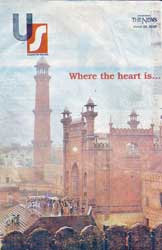
Lahore offered an infinite array of options when it came to eating; the outsiders often exclaimed the city to have only two ambitions: food and women. The restaurant culture thrived in the city with hotels at every turn. Anwar’s favourite, however, was Cuckoo’s Den. Although it was its ambience that was generally admired, Anwar’s choice was shaped by the location. Nestled cozily inside the famed Hira Mandi, the den rested under the azure skies. The Mandi, a remnant of Moghul times, did not just allure many, but had also endowed, interestingly, the film industry with many a singer and actress. While the girls of those streets practiced the world’s oldest profession for a living, the faithful would be kneeling before God in the fifth largest mosque of the world, Badshahi Masjid, at a stone’s throw. Before the mosque is buried Iqbal since 1938, the national poet of the country, and along with him is buried the iconic image of the Pakistan Iqbal wanted his dream to realize into. To the east of Iqbal, across the striking Huzoori Bagh with its bara-dari, lays the magnificent fort of Akbar with its shimmering Sheesh Mehal, Naulakha pavilion and Jehangir’s bedroom. To the north stood the Gurdwara and Samadhi of Ranjit Singh, where no non-Sikh was allowed to lay a foot. It was an incredible spectacle the Cuckoo’s presented. Sin, faith and splendour blended artistically with each other in the locale. An implausible bonding of piety and blaspheme to be witnessed nowhere but Lahore.
Fatima Zakir’s star kid
He is not the best writer Us ever had. He is not our oldest or the most regular contributor. He is not the most innovative one, too. Yet, I have no qualms in saying he is truly and absolutely my most favorite Us contributor. And yes, you can say it’s somewhat personal.
When I joined Us, we already had Saad Javed, Iqra Asad, Awais Aftab, Faiza Iftikhar, etc, as the driving force of the magazine. Young writers took inspiration from them. Asif Nawaz did a few articles, too, but in those years he actually started improving (or maybe I started taking his writings more seriously). I just knew this guy had potential and, today, I am so proud of him.
His thoughts, his words, his narratives ... everything just got better and crispier with time. I think it’s better to keep it more about ‘him’ than his writings. After all, he is on the cover this week for a reason.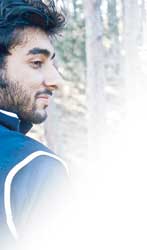
I remember enjoying his contributions and taking them on priority. (Sorry guys, but come on, his stories are worth it). I believe every Us sub-ed had a favourite writer whose writings touched them so much that it became personal. Well, Muhammad Asif Nawaz is that to me. He is my star!
When I finally met him last year, I realized he is not just a good writer but he is an amazing kid, too. Well-mannered, smart, adventurous and fun. Just a few minutes into the conversation and I swelled with pride, ‘Mera bacha to bahut pyara hai *khushi ke aansoo*’. Though, initially he had issues with me calling him my kid but I am pretty sure he is adjusted to it by now.
Asif Nawaz enjoys exploring new places, likes to capture moments in his camera and absolutely loves the sea. He talks less and talks sense. He likes to build stories from his experiences. He is way mature and decent for his age.
Oh! And I remember I still owe you the meeting with Mahira Khan, Asif! I will work out something, I promise.
Faiza Hameed shares Asif’s ‘profound sense of absurdity’
What could I possibly write about Asif that he hasn’t already written about himself? If you have read Asif, you know him. You know he loves inviting you in, putting you at ease, while he shows you around the latest godforsaken ruins he visited or the last book he read and hated or why he not-so-secretly thinks Mahira Khan should run for president. You simply cannot go to a story-telling party Asif throws and not have a good time. He’ll make sure you crack at least a few ribs laughing at the fertile produce of his insane sense of humour.
Perhaps I find his fervent, feverish love for writing all the more precious because it gave me his friendship. We became friends because we write. Also because we share a profound sense of absurdity that is otherwise so rare to come by. Also because we both have a few loose screws and neither of us seems to mind. There is this wonderful quote by Timothy Leary about finding “the others”, the missing pieces of your own puzzle. I believe Asif holds a very valuable piece of mine. For that and so much more, I am eternally grateful to him.
Rutaba Tanvir’s ode to Asif
I’ve been fortunate enough to have developed friendships with wonderful people because of my association with this even more wonderful magazine. There’s no limit to the talents they possess and the man we all know as Muhammad Asif Nawaz is no exception. At the expense of inciting public horror, I’d like to claim that there resides the soul of a gardener inside him. Because each word that he writes is like a well-tended tulip. Each sentence a full bloomed rose - his writings akin to an idyllic stroll through Lawrence Gardens. Borrowing from John Green, you fall in love with the tales Asif tells the way you fall asleep: slowly, and then all at once. It is as if the ink in his pen (or the keys of his laptop) is imbued with a mystical power; strong enough to capture your attention even when you least expect it.
Out of all the majestic journeys he’s taken his readers on, my personal favourites include (but aren’t limited to) the one which include my city. Lahore shimmers grandly in the vestibule of his imagination. On the other hand, his take on Karachi can even make the staunchest of Lahoris give space to the idea of a more tolerant, negotiable stance on the city by the sea. (*Silently whispers “Karachi you’re love!” and hopes no one from Lahore reads it*) Then there is that crisp humour. Quick-witted and thoroughly enjoyable, I’ll forever be grateful to him for all the smiles on my face he’s been the bringer of.  They’ve been a source of comfort when I was fighting my own microbe wars. I’m also thankful to him for reminding us all why it is important to believe in this country when darkness clouds our national judgement. Because, when all else fails, it is hope and hope alone that can take us forward. For all those reviews on books and movies that rescued me from bankruptcy. (To all Pakistani authors and filmmakers alike wondering why their work isn’t selling enough - now you know who’s responsible!) And finally, I’m grateful to this Us Star for believing in faith in its purest and holiest form in a world where it is abused ever so mercilessly, and in such vile ways. For all this and much more, he truly deserves the adulation he gets. May the power of his pen (or the keys of his laptop) never falter!
They’ve been a source of comfort when I was fighting my own microbe wars. I’m also thankful to him for reminding us all why it is important to believe in this country when darkness clouds our national judgement. Because, when all else fails, it is hope and hope alone that can take us forward. For all those reviews on books and movies that rescued me from bankruptcy. (To all Pakistani authors and filmmakers alike wondering why their work isn’t selling enough - now you know who’s responsible!) And finally, I’m grateful to this Us Star for believing in faith in its purest and holiest form in a world where it is abused ever so mercilessly, and in such vile ways. For all this and much more, he truly deserves the adulation he gets. May the power of his pen (or the keys of his laptop) never falter!
Haseeb Sultan’s insight
The place a person comes from really has an effect on the kind of person one turns out to be; and when it’s writers, you can imagine it through their writings. Asif is one of those writers whose words are influenced by the City he lives in: Abbottabad. You can see the beauty in them. Maybe coming from a valley, Nature’s wall, is how Asif learned to see the world through the lens of an outsider. His travel pieces are filled with insight that you know only he’ll be able to offer. His words are charming (he himself is, too!). But it’s not just the vision he depicts, but also a sense of humour he imparts to his words that make him a writer worth befriending. It’s the smile his words leave on one’s face as they imprint his name in one’s mind. His words make one feel them. Besides being a good writer, he’s an amazing listener and it’s a quality that’s too expensive to acquire in a friend. It’s just fun knowing him, and his words!
From “Impressions
of a cinema-goer”
The plot, despite being predictable, runs at a pace we all wish our trains run at (admittedly, I don’t really know if I got the whole story). Thank you for keeping it short and sweet - whatever! There’s enough of glamorising the desi feel in this film, including chaand raats with all the qawaali and bangle settings, and shaadi songs with all the pomp and show. (Spoiler alert: Adeel Hussain plays one of those Abdullahs who dance like deewanas in the weddings of begaanas, and vanish after collecting the money). People die like mosquitoes in this film. And God knows that even those who don’t, try at least once. They also fly like mosquitoes, as if United States is some phuppo ka ghar to Karachiites; money ain’t no issue, honey - neither are visa requirements. Mahira Khan plays the young, beautiful, desperately in love, (the way most South Asian women are) and the cousin of Humayun Saeed, who doesn’t play anything (the way most South Asian men are). Damage control on his age is done by inserting a dialogue that starts with, “Tees saal se ooper kay ho gaye ho...” But essentially, Bin Roye is about melodious soundtrack and Mahira Khan, who sizzles even (or especially) when the plot fizzles.
From “In the city
by the sea”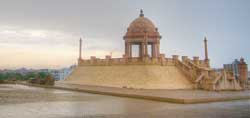
And Karachi, after all, has another identity. It’s God’s city. Not only because it happens to be the capital to the province that is still redolent of Sufi teachings and love. Not only because many different religions cohere in Karachi to bow before the divine; for Karachi is the most tolerant city of Pakistan, where subscription to any faith is respected. But also because that is what Karachiites believe. That it is God’s city because it lives after the greatest of tragedies, that it is God’s city because in case of the contrary, there’s no possible explanation of Karachi’s survival given the repeated blood-shed and tyranny. That it is God’s city because He himself expresses his wrath over the evil in the city. The temperature never gets this hot in Karachi. It is God’s wrath upon the city for the cold-blooded murders and throat-slitting of innumerable innocents in the past days...? - I was told. And finally, it is God’s city because this is the wisest and dumbest explanation of the madness that is Karachi.
From “Arz-e-watan”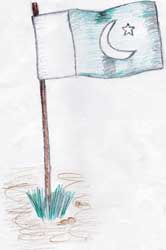
It’s Fajar. I can hear the azaan in the distance. The muezzin’s calling out to people, inviting them to pray, telling them salah is better than sleep. In minutes now, the first ray of sunlight will crack through the horizon. People will wake up from their state of deep slumber, readying for just another day. Forgiving others, forgetting things, making new beginnings ... armouring themselves with optimism, bathing in hope. ‘All will be good one day, we have faith!’ This is what they tell each other; this is what they tell themselves. When I wake up, I will perhaps be just as normal. To borrow from Jhumpa Lahiri, the blood of too many will have dissolved the stain. We all will continue to be what we were. New journeys will start. Life will go on as it was.
Life in my watan is as selfish as it is selfless. Life in my watan is as simple as it is complicated.
From “Parks and recreation”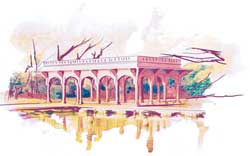
There are a few things in life as overwhelmingly enjoyable as jogs in the Lawrence Gardens. Beads of sweat appear on my forehead, spanning in rivulets across my brow - these lanes and alleys of the Walled City - and drip off the contours of my chin; the cracking of a colonial building on the Mall. I run beside the Weeping Willows, their branches stooping with the load of Lahore’s immense legacy, and the veins in my forearms protrude - metro buses rushing smoothly across these sleek tracks. I continue jogging, and the Quaid-e-Azam Library, my sole sense of direction in this park of various gates and twisted lanes, greets me past. I gulp some water down my throat, or have the orderly roads of Cantonment and Defence braved another unwonted spell of Monsoon? Squirrels dart playfully across the jamun trees, my gaze following them in the advancing facade of the city through the centuries. I pass the shrine of Baba Turat Murad Shah, eagerly frequented by those hoping to get married, and stop just there to catch my breath. I inhale, just in time for unison with hundreds catching their first glimpse of the city. I exhale, visibly exasperated at the unyielding attempts at haggling of those at Anarkali and Fortress Square. The sun is about to set, and the hills of the garden erupt in a fiery hue of orange, the same rays silhouetting these palms are saying their goodbye to Noor Jehan’s underground tomb right now. Following the activity, my heart beats fast, like the upscale work on the Orange Line at Chauburji Chowk, to cater to the body’s augmented oxygen demands; to fulfil the demands of this unquenchable city. The heart, the defiant soul of Lahore, slows down between bouts of over-activity; allowing love and literature to flow across the body of the city. And then I think I miss a beat. Are they cutting the trees along the Canal again?
From “An ode to Ayub”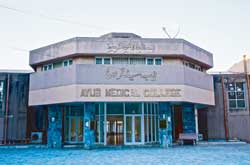
To be honest, at times it seems it’s cool to hate Ayub. You would often find people who couldn’t wait to get into Ayub now desperate to get out. And some reasons are understandable. The college leaves a lot to be desired when it comes to administration (some departments like Pharmacology do a tremendous job, though). And our hospital, the only tertiary care hospital of the region that serves everyone above this side of Attock to Gilgit, alone qualifies for some sort of Nobel Prize in mismanagement. But then, realisation of the problems is only the first step to go. Yes, we have problems (no, gossip girls and burnt shadows weeping over others’ better marks are not really problems), and no, we aren’t yet doing a great job at rectifying these. But then, there’s hope, right? I hope that those now in charge do a better job at managing this college than those before them, and those now studying in Ayub do a better job at owning this college than us.
From “Five types of people you meet at literature festivals”
But, thankfully, since most of these people have attention spans that pale miserably when compared to a goldfish’s memory span, they at once realise they’ve missed out on something no self-loving human should ever miss. Darks clouds hover around the building, horror exceeds unimaginable heights. And then there’s the selfie moment. Pouts and teeth. Mercifully, it only lasts some seconds, before the selfie-brigade spots someone else their other cousin had been in incubator with; and goes off to harass them. Now, having been a witness to this, you’ve completely forgotten what it was that you intended to ask. So you just go back to your seat and wait for the next session.
From “The ten tenacious tendencies”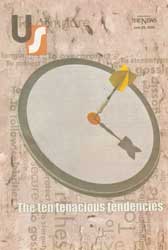
The fact may be that almost every dog under the sky comes to be called Tony somehow, mine included, but this doesn’t mean we should stereotype. Every topper isn’t a nerd, and every nerd isn’t that unbearable. For you see, guys like Steve Jobbs and Bill Gates who once were nerds are producing the coolest of all gadgets now. Appearances are often deceptive. The rich aren’t always filthy. The bearded aren’t always pious. Every guy doesn’t like Angelina Jolie. All teenagers aren’t depressed. And the fashion designers aren’t always bitchy. Indian media has a stereotypical image of ours as if the whole Lucknow migrated to Pakistan in 1947: we are hard-core conservatives, amusingly prim and hopelessly outdated. With 18.5 million internet users, we are the third largest growing internet users of the world, but hey, that contrasts with the doctored image of ours, so the CNN doesn’t tell you that.